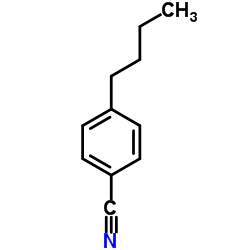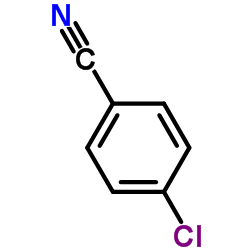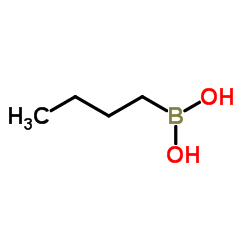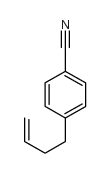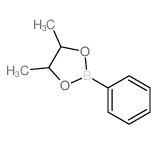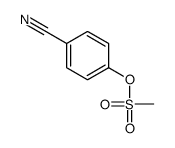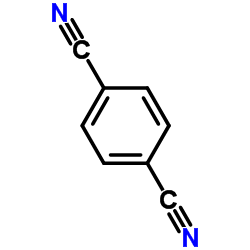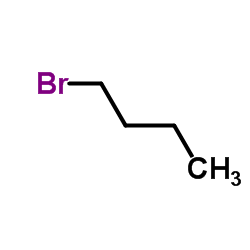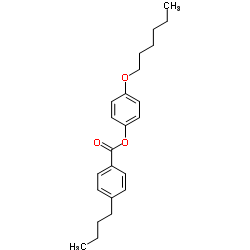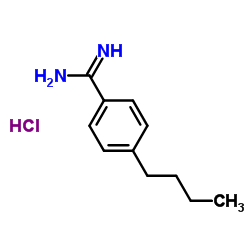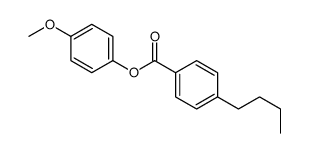20651-73-4
| 中文名 | 4-N-丁基苯甲腈 |
|---|---|
| 英文名 | 4-butylbenzonitrile |
| 中文别名 | 4-正丁基苯甲腈 |
| 英文别名 |
4-butylbenzenecarbonitrile
4-n-butylcyanobenzene 1-n-butylbenzonitrile p-n-butylbenzonitrile Benzonitrile,4-butyl 4-Butylbenzonitrile 4-n-Butylbenzonitrile MFCD00052345 |
| 密度 | 1.0±0.1 g/cm3 |
|---|---|
| 沸点 | 261.7±19.0 °C at 760 mmHg |
| 分子式 | C11H13N |
| 分子量 | 159.228 |
| 闪点 | 112.2±14.0 °C |
| 精确质量 | 159.104797 |
| PSA | 23.79000 |
| LogP | 3.71 |
| 外观性状 | 透明无色液体 |
| 蒸汽压 | 0.0±0.5 mmHg at 25°C |
| 折射率 | 1.514 |
| 储存条件 | 保持贮藏器密封 放入紧密的贮藏器内,储存在阴凉,干燥的地方 |
| 稳定性 | 如果遵照规格使用和储存则不会分解 避免接触氧化物 |
| 分子结构 | 1、 摩尔折射率:49.83 2、 摩尔体积(m3/mol):165.6 3、 等张比容(90.2K):411.5 4、 表面张力(dyne/cm):38.0 5、 极化率(10-24cm3):19.75 |
| 计算化学 | 1.疏水参数计算参考值(XlogP):无 2.氢键供体数量:0 3.氢键受体数量:1 4.可旋转化学键数量:3 5.互变异构体数量:无 6.拓扑分子极性表面积23.8 7.重原子数量:12 8.表面电荷:0 9.复杂度:157 10.同位素原子数量:0 11.确定原子立构中心数量:0 12.不确定原子立构中心数量:0 13.确定化学键立构中心数量:0 14.不确定化学键立构中心数量:0 15.共价键单元数量:1 |
| 更多 | 1.性状:未确定 2.密度(g/mL,25/4℃):0.924 3.相对蒸汽密度(g/mL,空气=1):未确定 4.熔点(ºC):未确定 5.沸点(ºC,常压):132-133 6.沸点(ºC,5.2kPa):未确定 7.折射率:1.515 8.闪点(ºC):145 9.比旋光度(º):未确定 10.自燃点或引燃温度(ºC):未确定 11.蒸气压(kPa,25ºC):未确定 12.饱和蒸气压(kPa,60ºC):未确定 13.燃烧热(KJ/mol):未确定 14.临界温度(ºC):未确定 15.临界压力(KPa):未确定 16.油水(辛醇/水)分配系数的对数值:未确定 17.爆炸上限(%,V/V):未确定 18.爆炸下限(%,V/V):未确定 19.溶解性:未确定 |
Synonym:None Known Section 2 - COMPOSITION, INFORMATION ON INGREDIENTS
Risk Phrases: 20/21/22 Section 3 - HAZARDS IDENTIFICATION EMERGENCY OVERVIEW
Harmful by inhalation, in contact with skin and if swallowed.The toxicological properties of this material have not been fully investigated. Potential Health Effects Eye: May cause eye irritation. Skin: May cause skin irritation. Harmful if absorbed through the skin. May be metabolized to cyanide which in turn acts by inhibiting cytochrome oxidase impairing cellular respiration. Ingestion: Harmful if swallowed. May cause irritation of the digestive tract. The toxicological properties of this substance have not been fully investigated. Metabolism may release cyanide, which may result in headache, dizziness, weakness, collapse, unconsciousness and possible death. Inhalation: Harmful if inhaled. May cause respiratory tract irritation. The toxicological properties of this substance have not been fully investigated. May be metabolized to cyanide which in turns act by inhibiting cytochrome oxidase impairing cellular respiration. Chronic: Chronic exposure to cyanide solutions may lead to the development of a "cyanide" rash, characterized by itching, and by macular, papular, and vesicular eruptions, and may be accompanied by secondary infections. Exposure to small amounts of cyanide compounds over long periods of time is reported to cause loss of appetite, headache, weakness, nausea, dizziness, and symptoms of irritation of the upper respiratory tract and eyes. Section 4 - FIRST AID MEASURES Eyes: In case of contact, immediately flush eyes with plenty of water for at least 15 minutes. Get medical aid. Skin: In case of contact, flush skin with plenty of water. Remove contaminated clothing and shoes. Get medical aid if irritation develops and persists. Wash clothing before reuse. Ingestion: If swallowed, do not induce vomiting unless directed to do so by medical personnel. Never give anything by mouth to an unconscious person. Get medical aid. Inhalation: Remove from exposure and move to fresh air immediately. If breathing is difficult, give oxygen. Get medical aid. Do NOT use mouth-to-mouth resuscitation. If breathing has ceased apply artificial respiration using oxygen and a suitable mechanical device such as a bag and a mask. Notes to Physician: Treat symptomatically and supportively. Section 5 - FIRE FIGHTING MEASURES General Information: As in any fire, wear a self-contained breathing apparatus in pressure-demand, MSHA/NIOSH (approved or equivalent), and full protective gear. During a fire, irritating and highly toxic gases may be generated by thermal decomposition or combustion. Vapors may be heavier than air. They can spread along the ground and collect in low or confined areas. Runoff from fire control or dilution water may cause pollution. Extinguishing Media: Use foam, dry chemical, or carbon dioxide. Section 6 - ACCIDENTAL RELEASE MEASURES General Information: Use proper personal protective equipment as indicated in Section 8. Spills/Leaks: Absorb spill with inert material (e.g. vermiculite, sand or earth), then place in suitable container. Avoid runoff into storm sewers and ditches which lead to waterways. Clean up spills immediately, observing precautions in the Protective Equipment section. Provide ventilation. Section 7 - HANDLING and STORAGE Handling: Wash thoroughly after handling. Avoid breathing dust, vapor, mist, or gas. Avoid contact with eyes, skin, and clothing. Keep container tightly closed. Avoid ingestion and inhalation. Use only in a chemical fume hood. Storage: Store in a cool, dry place. Store in a tightly closed container. Section 8 - EXPOSURE CONTROLS, PERSONAL PROTECTION Engineering Controls: Facilities storing or utilizing this material should be equipped with an eyewash facility and a safety shower. Use adequate ventilation to keep airborne concentrations low. Exposure Limits CAS# 20651-73-4: Personal Protective Equipment Eyes: Wear chemical splash goggles. Skin: Wear appropriate protective gloves to prevent skin exposure. Clothing: Wear appropriate protective clothing to prevent skin exposure. Respirators: Follow the OSHA respirator regulations found in 29 CFR 1910.134 or European Standard EN 149. Use a NIOSH/MSHA or European Standard EN 149 approved respirator if exposure limits are exceeded or if irritation or other symptoms are experienced. Section 9 - PHYSICAL AND CHEMICAL PROPERTIES Physical State: Liquid Color: clear colorless Odor: Not available. pH: Not available. Vapor Pressure: Not available. Viscosity: Not available. Boiling Point: 130 - 132 deg C @ 15mmHg Freezing/Melting Point: Not available. Autoignition Temperature: Not available. Flash Point: Not available. Explosion Limits, lower: Not available. Explosion Limits, upper: Not available. Decomposition Temperature: Solubility in water: Specific Gravity/Density: Molecular Formula: C11H13N Molecular Weight: 159.0977 Section 10 - STABILITY AND REACTIVITY Chemical Stability: Not currently available. Conditions to Avoid: Incompatible materials, excess heat. Incompatibilities with Other Materials: Strong oxidizing agents, strong acids, strong bases, strong reducing agents. Hazardous Decomposition Products: Nitrogen oxides, carbon monoxide, carbon dioxide. Hazardous Polymerization: Has not been reported Section 11 - TOXICOLOGICAL INFORMATION RTECS#: CAS# 20651-73-4 unlisted. LD50/LC50: Not available. Carcinogenicity: 4-n-Butylbenzonitrile - Not listed by ACGIH, IARC, or NTP. Section 12 - ECOLOGICAL INFORMATION Section 13 - DISPOSAL CONSIDERATIONS Dispose of in a manner consistent with federal, state, and local regulations. Section 14 - TRANSPORT INFORMATION IATA Shipping Name: NITRILES, LIQUID, TOXIC, N.O.S.* Hazard Class: 6.1 UN Number: 3276 Packing Group: III IMO Shipping Name: NITRILES, LIQUID, TOXIC, N.O.S. Hazard Class: 6.1 UN Number: 3276 Packing Group: III RID/ADR Shipping Name: NITRILES, LIQUID, TOXIC, N.O.S. Hazard Class: 6.1 UN Number: 3276 Packing group: III Section 15 - REGULATORY INFORMATION European/International Regulations European Labeling in Accordance with EC Directives Hazard Symbols: XN Risk Phrases: R 20/21/22 Harmful by inhalation, in contact with skin and if swallowed. Safety Phrases: S 36/37 Wear suitable protective clothing and gloves. WGK (Water Danger/Protection) CAS# 20651-73-4: No information available. Canada None of the chemicals in this product are listed on the DSL/NDSL list. CAS# 20651-73-4 is not listed on Canada's Ingredient Disclosure List. US FEDERAL TSCA CAS# 20651-73-4 is not listed on the TSCA inventory. It is for research and development use only. SECTION 16 - ADDITIONAL INFORMATION N/A |
|
生态学数据: 对水是稍微危害的,若无政府许可,勿将材料排入周围环境
|
| 符号 |

GHS07 |
|---|---|
| 信号词 | Warning |
| 危害声明 | H302-H312-H315-H319-H332-H335 |
| 警示性声明 | P261-P280-P305 + P351 + P338 |
| 个人防护装备 | Eyeshields;Faceshields;full-face respirator (US);Gloves;multi-purpose combination respirator cartridge (US);type ABEK (EN14387) respirator filter |
| 危害码 (欧洲) | Xn,Xi |
| 风险声明 (欧洲) | R20/21/22 |
| 安全声明 (欧洲) | S26-S36 |
| 危险品运输编码 | 3276 |
| WGK德国 | 3 |
| 包装等级 | III |
| 危险类别 | 6.1 |
| 海关编码 | 2926909090 |
| 上游产品 9 | |
|---|---|
| 下游产品 5 | |
| 海关编码 | 2926909090 |
|---|---|
| 中文概述 | 2926909090 其他腈基化合物. 增值税率:17.0% 退税率:9.0% 监管条件:无 最惠国关税:6.5% 普通关税:30.0% |
| 申报要素 | 品名, 成分含量, 用途 |
| Summary | HS:2926909090 other nitrile-function compounds VAT:17.0% Tax rebate rate:9.0% Supervision conditions:none MFN tariff:6.5% General tariff:30.0% |


